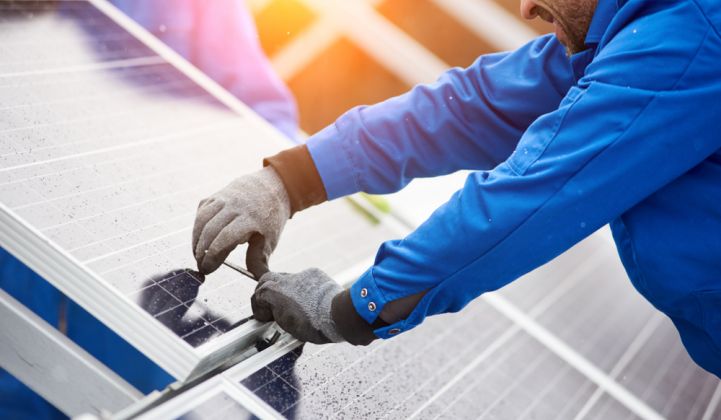Cypress Creek Renewables, the nation's fifth-largest solar developer and last year's top utility-scale installer, says it will take a $1.5 billion hit due to the Trump administration’s solar tariffs.
Greentech Media confirmed the figure, first reported by Bloomberg, that the company has stopped investing in 1.5 gigawatts of projects — roughly 20 percent of its pipeline — because of the tariffs.
“Because utility-scale solar is extremely price-sensitive, the tariff forced us to re-evaluate some of our projects,” said Jeff McKay, communications director at Cypress Creek. “We can confidently say that we will not be able to move forward with $1.5 billion...of projects as things stand now.”
McKay said the projects were to be sited all around the country, in emerging as well as developed state markets such as California. The majority were slated for the Carolinas. While some of these projects were in early development, others already included offtake agreements.
To perhaps save that chunk of its pipeline — and the jobs and tax investment that comes with it — Cypress Creek in March filed for an exemption for the 72-cell, 1,500-volt crystalline silicon photovoltaic modules that are often used in utility-scale projects. These modules contain more watts per panel when compared to standard 60-cell modules, so there's a case to be made that the technology serves a unique role in the market and deserves special treatment.
EDF Renewable Energy, NRG Renewables, E.ON North America, Tradewind Energy, Southern Current, Swinerton Renewable Energy and sPower joined Cypress Creek in the filing. Their request hinges on the argument that domestic supply of those modules does not meet demand.
In April, tracker and racking companies including NextTracker submitted a letter supporting the exemption. Last week, a group of eight Republican Senators joined the effort, writing a letter that argued an exemption would protect jobs and would not undermine the intent of the tariffs.
"The exclusion of 72-cell, 1,500-volt solar panels from the safeguard measure will preserve tens of thousands of existing solar manufacturing and development jobs, foster market expansion, and allow the U.S. to once again fairly compete in the global marketplace for energy production technologies," the letter states.
As some support seems to be coalescing around an exemption, others in the industry have questioned the impact an exemption could have on Trump’s intended push for U.S. manufacturing or other sectors of the U.S. market. Bloomberg noted Friday that an exemption for utility-scale products might spur a bump in price for residential rooftop installations as manufacturers outside the U.S. shift to products not subject to the tariff.
But GTM Research analysts said that reasoning doesn’t pencil out.
“Removal of tariffs would not increase the cost of modules sold to the residential market unless there was some kind of supply tightness,” said Jade Jones, a senior solar analyst at GTM Research. “If there was an exemption and it’s possible for a supplier to sell more to the U.S. utility market — the largest-volume market — suppliers would have reason to expand capacity in Southeast Asia, thus avoiding any tightness.”
Jones also noted that any exemption for these modules is unlikely to significantly impact companies that have announced strategies incorporating U.S. manufacturing, including Jinko and SunPower, because those companies can pursue opportunities outside utility-scale products.
“The advantage SunPower or Jinko has is not [necessarily] taken away with an exemption,” she said. "With its P-Series modules, SunPower is focusing on high-power modules with good shading resistance that may be more ideal for residential and commercial or residential. Jinko has some volumes locked in already, but it may use some of its domestic capacity to serve the residential market where it can get a little more of a premium to offset some of the slightly higher costs of processing modules in the U.S."
The utility-scale market would more directly feel the impact of such an exemption, according to GTM Research solar analyst Colin Smith.
In mature markets, developers and utilities proceeded with hesitancy due to tariff uncertainty. But Smith said emerging markets face the most delays, with a pause of months or years in the progression from pilot projects to a year-over-year procurement scenario.
With an exemption for 72-cell, 1,500-volt modules, “Emerging markets might start to emerge again,” he said.
First Solar, which supported the 201 petitioners and does focus on the utility-scale market, could also be insulated because of 10.6-gigawatt pipeline it has built.
McKay at Cypress Creek said an exemption would greatly shift the impacts for other utility-scale developers in the U.S. and help rural areas with tax benefits and employment.
“Utility-scale makes too much economic sense not to continue to grow. Inputting any uncertainty like this — we don’t think it’s going to cripple the industry by any means, but it really does slow things down,” he said. “An exclusion of 1,500-volt modules would unleash billions of dollars and tens of thousands of jobs, including manufacturing jobs in the steel racking industry.”
It’s currently unclear when the administration will make a determination on any exemptions. The U.S. Trade Representative's Office is also fielding exemption requests on a variety of products named in an April list under Section 301 of the Trade Act of 1974 that could face duties of 25 percent.
Several clean energy technology-related products landed among the 1,300 listed imports, including wind generating assets and some DC motors.
Last week, groups including the Alliance to Save Energy and the American Wind Energy Association wrote to the administration asking for the exemption of LED lights, “parts and products related to the production of electric vehicles,” appliances and their components and automatic thermostats. In its comments, Advanced Energy Economy also asked for the exemption of wind energy generating assets.
The groups said including these products in a tariff scheme “would be counter to the administration’s stated goals for a more energy-secure economy.”




